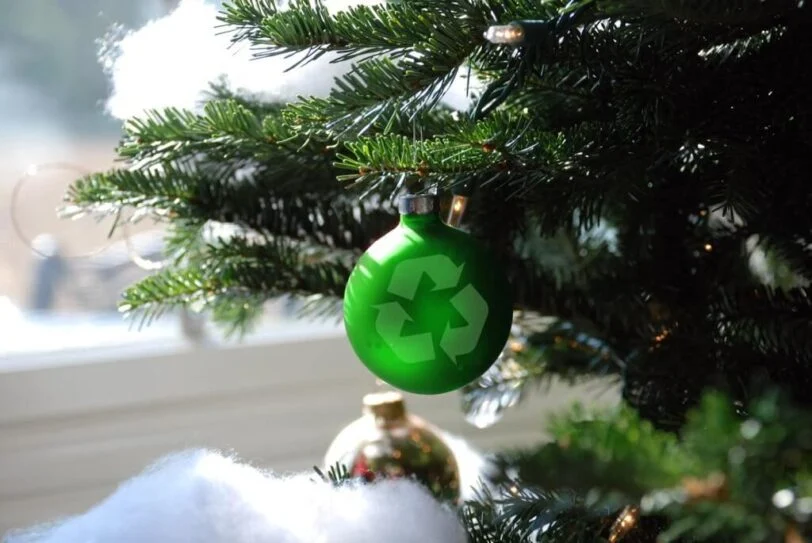The Festive Season is Upon Us – Let’s Make it a Green One.
This year, just like last year, will end with lots of spending. The shops have already started their green and red campaigns and the temptations to buy things we don’t need are coming in hot and fast. Soon we’ll be splurging on cakes and cooldrinks and decorative knick-knacks, and don’t get me started on alcohol. Last Christmas, South Africans spent R7.7 billion[1] on beer alone.
And why? Because ke Dezemba. Anything goes.
But it’s time to talk about the elephant in the room. The environment. December can be a heartbreaking month for nature because of all the extra waste humans are producing. Whether you see it nearby or it’s a distant truth where you live, pollution gets worse in the festive season.

5 Easy Ways to Go Green (and Save Money) This December
1.Don’t Buy Anything for Once-Off Use
If you buy disposable tableware and decor a lot, all the December parties and braais really start to add up. You really don’t need paper plates and plastic cups for everything. The same goes for themed plastic tablecloths, red and white straws, and individually-wrapped toothpicks. These are single-use items you can easily replace with reusable ones (yes, even when you’re eating outdoors).
If that sounds inconvenient, you may need to get better at planning. Long before you head to the picnic, make a list of everything you need besides food. Giving yourself enough time is important. When you stop leaving things to the last minute, you can collect reusable items (like steel camping cups) in advance. Having what you need beforehand means you won’t have to fork out money for stuff you’re just going to throw away after the party.
2.Commit to No Food Wasted
Nearly a third[2] of the food produced in South Africa gets wasted. Fruits and vegetables end up in dumps, pap gets scraped to the ground, and leftover meat spoils quietly in the fridge. This is a tragedy! Millions of people go to bed hungry every night. If you are one of the lucky ones to sit down to a feast this Christmas, make sure you don’t let the leftovers go to waste.
Instead, send your loved ones home with a takeaway or make a Boxing Day potjie with bits of meat from the day before. If you honestly don’t think you’ll eat everything, donate some to those in need. Handing out a takeaway at the robot could make somebody’s day.
If it’s raw stuff or uncooked ingredients that you have to spare, there are always churches, old-age homes, homeless shelters and orphanages in need. Check out this map from SA Harvest to find beneficiaries for food donations near you.

3.Wear What You Have, Borrow What You Don’t
Everyone knows the last quarter of the year is shopping season. Retailers launch summer sales, Black Friday deals, and festive holiday promos that have consumers storming the aisles in-store and online. Many of us take the opportunity to give ourselves (and our loved ones) a wardrobe makeover. We buy new outfits for the pool, the restaurant, and even the airport.
Sometimes, these are clothes we actually need, but more often than not, they’re fashion statements we will hardly ever wear. If you’re buying cheap stuff from fast fashion brands, it might not even last until next summer. A greener choice would be to buy less and borrow more. Nobody actually remembers what you wore to the office Christmas party last year, so just rewear it. If you absolutely have to shop, try thrifting at a vintage market instead.
4.Love Local Gift Shopping
If you are expected to buy presents during December, you already know the financial strain it can bring, but what about the environmental impact? Gift-giving is not bad, but it can be wasteful. This is especially true for imported items you order online. Shipping long-distance requires a lot of fuel and comes with high greenhouse gas emissions. It also brings excessive packaging into your home.
A greener way to gift shop is supporting local entrepreneurs and buying proudly South African products. If you’re not sure where to find these things, Christmas markets are a good place to start. Here you can buy from growers, makers, and artists in your community. If you don’t find anything you like, try giving someone an experience instead. That could be a gift voucher for a spa day, hair treatment, game drive, golf day, or date-night dinner.

5.Keep Your Empties for a January Pay Day
Many of us go through lots of glass during the festive season. If your celebrations include 750ml quarts or 660ml bottles from SAB, you could be stashing them and exchanging them for cash. Most bottle stores and taverns will accept your empties if you bring them back clean and unbroken. Buy a whole case of beers, and you get a return on the plastic crate itself.
These small payments can make a big difference in January when cash doesn’t flow so freely. When you take returnable bottles back to the shop, they send them back to SAB for cleaning and refilling. This method is far more eco-friendly than throwing your bottles in the rubbish or even recycling them in a glass bank.
Businesses, Get Your Customers on Board
Going green shouldn’t rest on the public’s shoulders – businesses must play their part too. This festive season, consider changing the types of promotions you run to emphasise sustainability and help your customers have an eco-friendly December. For more information about environmental laws in SA and compliance for businesses, get in touch with eWASA today.
SOURCES:
- https://www.dailymaverick.co.za/article/2024-01-24-december-consumer-spending-patterns-more-cash-more-groceries-less-fuel-and-lots-of-booze/
- https://www.statssa.gov.za/?p=16831
- https://sacsc.co.za/articles/festive-season-2023-trends
[1] Based on data from NIQ consumer research
[2] https://www.statssa.gov.za/?p=16831


